Written by Adam Searles, a Ph.D. student in the School of Natural Resources and the Environment
 The Nature Coast Biological Station has facilitated a plethora of field- and classroom-based opportunities for students at UF. A highlight of this year’s slate of unique educational opportunities was Methods in Marine & Estuarine Ecology (EVS 4932). This research-intensive course was instructed by Adam Searles, an SNRE Ph.D. student affiliated with the Nature Coast Biological Station, and co-instructed by Charles Martin and Laura Reynolds, UF faculty affiliated with the station. During this course, students focused on learning practical hands-on skills commonly used in the field of marine ecology. For example, students regularly practiced gut content analysis, fish and invertebrate taxonomic identification, and seagrass core sample processing.
The Nature Coast Biological Station has facilitated a plethora of field- and classroom-based opportunities for students at UF. A highlight of this year’s slate of unique educational opportunities was Methods in Marine & Estuarine Ecology (EVS 4932). This research-intensive course was instructed by Adam Searles, an SNRE Ph.D. student affiliated with the Nature Coast Biological Station, and co-instructed by Charles Martin and Laura Reynolds, UF faculty affiliated with the station. During this course, students focused on learning practical hands-on skills commonly used in the field of marine ecology. For example, students regularly practiced gut content analysis, fish and invertebrate taxonomic identification, and seagrass core sample processing.
The Nature Coast Biological Station played a vital role in student success over the course of EVS 4932. During class time, station faculty served on Q&A panels, discussed relevant scientific studies, and provided insight into their journey through academia and a career in research. Students also used station vessels to explore the Seahorse Key Marine Lab and conduct fieldwork in the Cedar Key area to fulfill hands-on learning objectives. The class’s final exam was administered aboard a station vessel during this time. The exam consisted of students deploying sampling gear, including a beam trawl and a seagrass core, and identifying captured fish and invertebrate species. Through this experience, students were exposed to the local biodiversity of the Nature Coast region and gained practical research skills that they will be able to employ in their future careers. The field portion of the class received positive reviews and was many students’ favorite portion of the course.



 0
0
